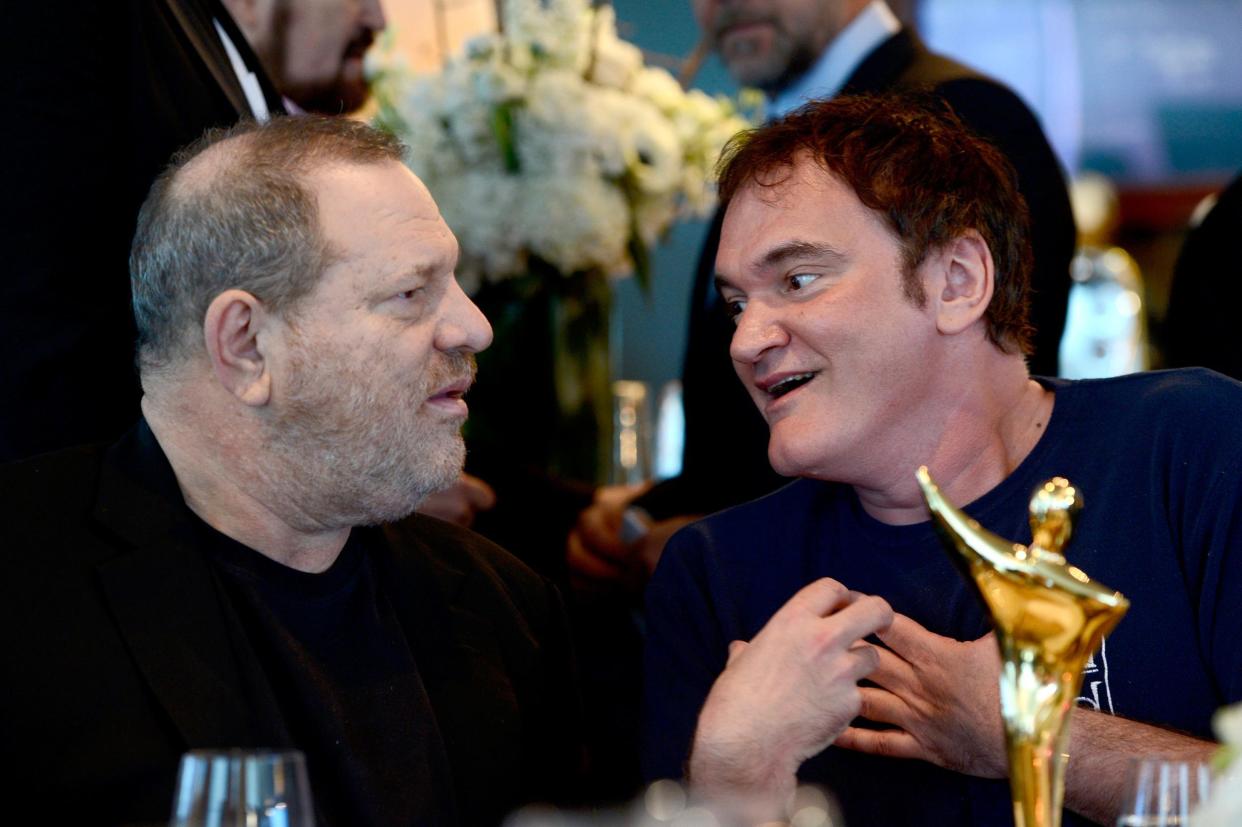Don’t tell me Quentin Tarantino doesn’t understand why Harvey Weinstein did what he did

I thought Quentin Tarantino loved a revenge flick. But while they’re fun to make and watch, it’s probably less enjoyable to find yourself dangerously close to one of the targets, which may explain why a New York Times interview this week saw an uncharacteristically contrite and confessional Tarantino talking about his relationship with Harvey Weinstein. “I knew enough to do more than I did,” he told the paper. “I wish I had taken responsibility for what I heard. If I had done the work I should have done then, I would not have had to work with him.”
Some thoughts here: by “knowing enough”, Tarantino means he heard two first-hand accounts from victims of Weinstein including his own then-girlfriend Mira Sorvino, and by “doing more than he did” he means he did absolutely not one thing. Oh no, he did do something: he kept on working with Weinstein, racking up the box office to their mutual benefit.
Tarantino hardly “had” to work with Weinstein. He was not trapped in a bedroom scoping out a way to evade a grabby tonnage wrapped in a bathrobe. The guy who made Reservoir Dogs and Pulp Fiction presumably had a few options when it came to collaborators. Working with Weinstein, in full knowledge of the allegations, was his choice. Now Tarantino says he’s “calling on the other guys who knew more to not be scared. Don’t just give out statements. Acknowledge that there was something rotten in Denmark. Vow to do better by our sisters.”
And that’s a nice intention, or at least a definite step up on the several decades of the industry tolerating and facilitating predations because “that’s just what happens”. But what’s the point of men talking about sexual abuse if they can’t also talk about power? Weinstein was protected while he had power, and lost that protection when he stopped being a cinematic rainmaker. In 1997, Harvey Weinstein was a hard target for journalists; in 2017, he’s a soft one.
None of this should be confusing, least of all to Tarantino who’s made a whole career from stories about men doing heinous things because they can. Why do Marsellus Wallace’s kidnappers rape him in Pulp Fiction? Because they can. Why does the nurse rape the comatose Bride and prostitute her to his friends in Kill Bill? Because he can. “I don’t have an answer for why he could do this and be stripped of his entire legacy,” says Tarantino. Come on now. Sure you can guess.
Weinstein did what he wanted because he could, and given his unassailable position in Hollywood until recently, he can’t have imagined for a moment that his legacy would ever be in question. And nor did Tarantino. The question shouldn’t be “how did he get away with it for so long?” Every single person who was bullied, bribed or flattered into ignoring the obvious knows the answer to that. It’s just not an answer that’s very complimentary to their own self-image.
A better question is: which men are abusing their power now? Not just in the film business, but in every business, the deluge of Weinstein revelations has kicked off a lust for justice. And good: every man who’s ever left a female colleague dealing with the sickly self-doubt sexual harassment inflicts should feel bad, should be waiting for the Twitter alert announcing his public shaming in the same way his victims waited for his breath on their necks, his eyes on their cleavage, his hand on her skin, his patronage withdrawn when he didn’t get what he wanted.
But be honest. Are the men who get brought down by public outings going to be the powerful ones, or are they going to be the easy targets? Are they going to be ones who make the decisions, or are they going to be the expendables? Are they going to be the gropers in their pomp, or the ones on the long slide from relevance?
In other words: are we going to get freedom and safety for women, or are we going to get catharsis?
Catharsis is good. Catharsis is exciting. Freedom and safety are boring: they’re workplace legislation, they’re active union reps, they’re engineering equal representation of women in key positions to break up the boy’s club silences that cover so much abuse, they’re a police force that treats female testimony as serious evidence. And they’re also better than catharsis, but achieving them means less of a gratifying hunt for that one more bad man whose destruction will put everything right, more embracing systems and standards that mean no man gets to be bad in all those low-key ways that crush women at work.
That means talking about power. For men like Tarantino, it means not just saying that you’ll use your power better in future, but doing the really honest thing and acknowledging how messed up it is for men to have so much control and women to have so little. (Only 7 per cent of top directors are women, a number that actually fell in 2016. Not every industry is quite that bad, but most of them are pretty bad.) Not “vow to do better by our sisters”, but vow to put your sisters in the boss roles that would let them do better by themselves. Only then can men start to let themselves off the hook for all their complicity, and worse, against their female colleagues.

 Yahoo News
Yahoo News 